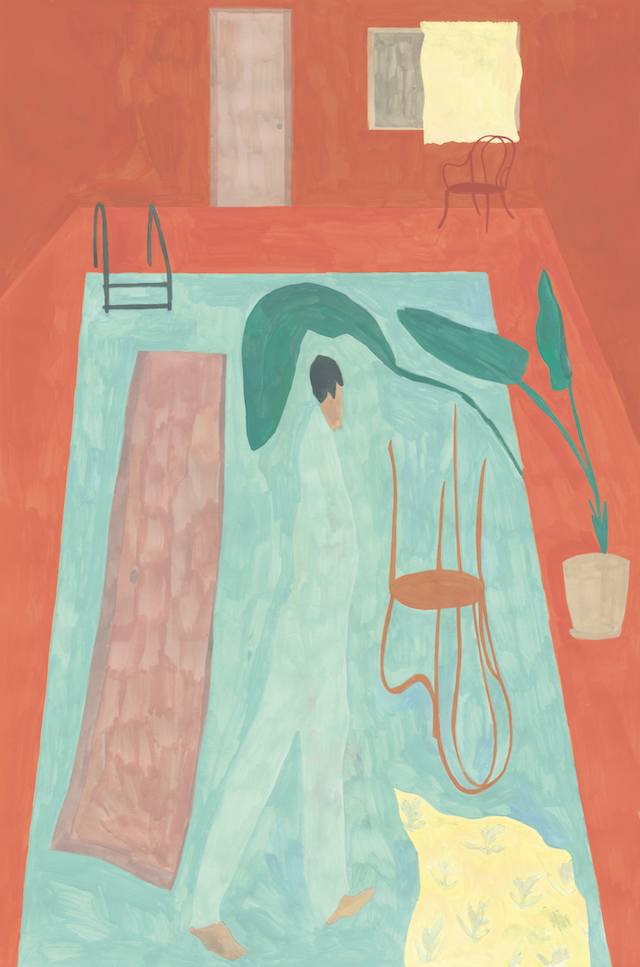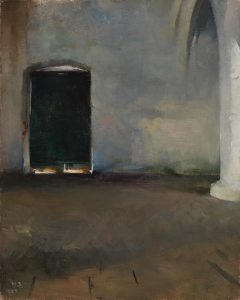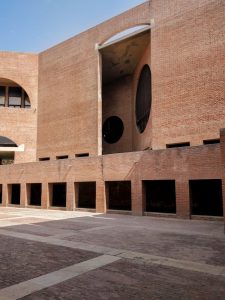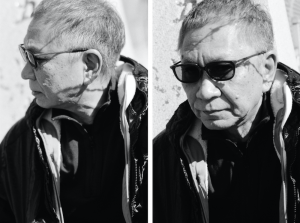Jack Underwood is a poet, critic and senior lecturer in creative writing at Goldsmiths, University of London. Winner of the Eric Gregory Award in 2007, his first collection, Happiness, was published by Faber & Faber in 2015. The following extract – running in issue 28’s Commentary – is taken from Underwood’s upcoming debut non-fiction work, Not Even This, a lyric essay penned in the wake of his daughter’s birth that reappraises, with fresh urgency, the importance of language as a ‘realm of intimacy, overlap, hope and trust’

You are five weeks old. You weigh about four kilograms, the same as our cat. Your vision can only draw objects into focus if they lie within forty centimetres of your face. The rest is background. Your sense of day, night, your body and what lies beyond it, is vague. I am not sure whether you are able to isolate your own voice from the rest of sound, whether your cry is something you feel that you make, or if it is suddenly just there, part of the world.
I watch your face, errantly exploring its possible positions and combinations, and I think I can see recognition taking hold. Not of me, or the room, but of yourself, being here. I know that you are already beginning to impress your memory onto the present, stopping you from existing in a constant state of spooling, endless newness. And we, as your parents, are a central part of that impression of continuity: our faces arriving above your cot and leaving again, waking, feeding, changing, sleeping, not sleeping, the light of the 4 a.m. television, muted with subtitles, the patterns of our shift work across this bleary, newborn time zone, daily ceremonies… these are your first worldly repetitions, the first structures by which you navigate your presence, or predict and prepare for whatever sensation comes next; in other words, your first language.
The brain is not a general-purpose device. […] Human concepts and human language are not random or arbitrary; they are highly structured and limited, because of the limits and structure of the brain, the body, and the world.
– George Lakoff and Rafael E. Núñez
Your fluency in this language is absolute, because you have never known another way of measuring yourself against the passing of time. We all started off this way: a tiny pool of repetitions imposed upon the present, giving our novel lives the impression of similarity, when in truth, no one has ever been anywhere before, despite the mind’s invigilation.
Then the tiny pool floods out and deepens. We continue to draw our past into the present. But we also begin to imagine alternative versions of events. We triangulate and rerun. We edit and fantasise. And we rehearse our futures too, catastrophic or heroic, the terrible accident, the narrow escape, the mot juste, the acceptance speech… The outside world, various and ready, runs parallel to the creativity of our inner lives, each tramline steering the other. And somehow language mediates. Or perhaps it rescues us from meaninglessness: modulating what we feel and imagine with its concepts, its theoretical frameworks. Language lays its names over and across the present like the eastings and northings and contours of a map. It gives shape and reason, a stable sense of relativity within its system, and a relationality with the world.
By adulthood, language and reality are hard to tell apart. The tiny pool of our early repetitions has become a great wide lake of terms and laws to apply… there is so much language to our consciousness that we scarcely move beyond those waters, while our desires and impulses coalesce in the unknown depths and eddies, convecting in the dark: those drowned voices, hidden from memory, that rise and find us in our sleep, half remembered, rarely understood.
This will happen to you too. With your ‘highly structured and limited’ brain, you will learn like the rest of us to recognise the feeling of being as a pattern, and part of me mourns this loss for you. You’re still so beginning! The slide into a conceptual present feels so brutal. Perhaps it is the inevitability of it; as if you could live some more authentic, less moderated existence instead, and your wild, contingent, newborn way of being in the world might be preserved or protected; as if you will one day grow up and demand to know why I didn’t save you from language, this dulled, violently categorical version of being alive.
*
Three months have passed. Your world is no longer encountered as a diffuse, contingent mass of stimuli hailing you from within and without, but as a collection of things in relation to yourself. I can see already how insidiously, how without thinking, the words and symbols for these things will arrive next, as if they were not sounds and shapes that we taught you to make, over and over, but somehow part of the things themselves:
We must consider ourselves as a symbolic, semantic class of life […] the word is not the thing.
– Alfred Korzybski
Your brain, thoroughly calibrated by thousands of years of evolution to choose the efficiency and safety of finding repetition over the vulnerability of living in a world perpetually new, is readying itself for the nameable world. In time you will simply accept the limited version, its habitual roll call, and so you will reduce your reality in order to know it.
A door.
A tree.
Water.
*
Now I am wishing the days away. In such a hurry. I want to know you, and to be known by you more and more. I want you to be more arrived. Why does this part take so long? I want you to speak to me, to pass the symbols back and forth, so that it feels as if we are, yes, both here – not just here in the world, but in the world and in language simultaneously: a place where love and knowledge can be declared with a reassuring sense of ongoing permanence. I want you to meet me here, where the words are!
*
Daddy. A name. A handle. A contract. And it is a mad wish, really, to want to be named that way, because if anything I am lost in its prevalence. It is only a rain cloud to stand in. But such contracts are all we have to know one another.
*
But does language really reduce our contact with reality? All at once, in a gasp of thought, it seems only to complicate the world, to open it up to us; there is so much of it, and it takes so many different forms, with its signs and gestures and ceremonies. How miraculous that it might bring you closer to the surface of yourself and to us, bring you here to me. Every day we say it: bring her to me, give her to me, let me take her, and doesn’t language do that more than anything else? An equal miracle to being alive and witnessing another life begin is being able to make life comprehensible. It is miraculous that we possess the faculties to simplify reality for ourselves in this way.
In otherwise total darkness
there was a handle
became my hand
and I was very somewhere
when suddenly I took it.
*
Then, today, I looked at you and thought about all the repression and the burying that human beings attend to in exchange for this workable coherence within ourselves and with the world. I thought about how we burn and fuse the brain’s shorter routes to learn, how we teach ourselves with the pain that the body makes for us, its harsh replies, to expect the ground to be hard, to expect radiators, oven doors, cups of tea to be hot, to fear love and connection that might one day be lost… You cannot even swallow solid food yet, or deliberately drop an object… Your mind’s sums of reduction will also be your mode of survival; without them, where would any of us be? Not here at all.
*
I searched online to find out how far you can see. There was no average visual range given for a five-month-old baby, but I did discover that you now have the fundamentals of depth perception. You can experience distance. It makes me imagine the time when our faces must have simply bubbled up before you.
I also learned that the central visual range of the human eye is only 5 degrees, and that most of our 120 degrees of vision is peripheral. It is the eye’s narrow progress across an object that accumulates a sense of its whole, in the form of memory; we rarely see anything in one go. Most of what we ‘see’ is what we remember. I go and run the tap. What am I looking at?
We do not think real time. But we live it, because life transcends intellect.
– Henri Bergson
*
I distract myself and do not stop
to remember my clothes
are not my body, or
to listen to paintings.
Am I even in a room, or just following
its story to the next confusion
like my weight on the floor?
I want to tell you
there is a necessary loneliness
in anything unverified;
loneliness is anything unverified.
It’s 4:21 a.m. and I have taken you
to the sofa so your mother can sleep,
the television flickers blue
with the sound down
subtitles landing the story in chunks
while you shut yourself in sleep
and I am not lonely
but laying to waste
the rest of my life
over my shoulder
to be here this way
with you like a habit
like a knack or a lock
like the downturn or narrowing
on my face,
which I hardly ever check
to read, daughter,
in a line of cars at night,
or a line of thoughts preceding,
and when I do, I lie.
Not Even This: Poetry, parenthood and living uncertainly by Jack Underwood is published by Corsair, an imprint of the Little, Brown Book Group, May 2021
Illustration Dror Cohen

This article is taken from Port issue 28. To continue reading, buy the issue or subscribe here




